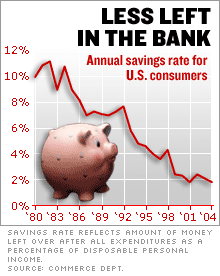charlottebandito
Dryer sheet wannabe
- Joined
- May 15, 2005
- Messages
- 23
The zero-savings problem
Some savings measures show households are flush, but consumers are spending every dime they make.
August 2, 2005: 4:59 PM EDT
By Chris Isidore, CNN/Money senior writer

NEW YORK (CNN/Money) - The savings of U.S. consumers are:
a) at the lowest rate since the Depression.
b) at peaks not seen even during the stock market boom of the late 1990s.
c) all of the above.
If you're wondering how "all of the above" could be the correct answer -- and it is -- walk outside your front door and look around.
http://money.cnn.com/2005/08/02/news/economy/savings/index.htm
I've had some people in church call me a killjoy because I don't carry $1000s of bad debt (credit cards) and don't spend money on frivilous items. With Oil/Energy going haywire, the increase of Interest-Only loans and the "awaited" interest hikes around the corner (Real Estate bubble), and the massive debt from the Defense department, something's up right around the corner and I don't think it's pretty. This article compares the similarities between today's conditions and those of the Great Depression.
Interesting.
Some savings measures show households are flush, but consumers are spending every dime they make.
August 2, 2005: 4:59 PM EDT
By Chris Isidore, CNN/Money senior writer

NEW YORK (CNN/Money) - The savings of U.S. consumers are:
a) at the lowest rate since the Depression.
b) at peaks not seen even during the stock market boom of the late 1990s.
c) all of the above.
If you're wondering how "all of the above" could be the correct answer -- and it is -- walk outside your front door and look around.
http://money.cnn.com/2005/08/02/news/economy/savings/index.htm
I've had some people in church call me a killjoy because I don't carry $1000s of bad debt (credit cards) and don't spend money on frivilous items. With Oil/Energy going haywire, the increase of Interest-Only loans and the "awaited" interest hikes around the corner (Real Estate bubble), and the massive debt from the Defense department, something's up right around the corner and I don't think it's pretty. This article compares the similarities between today's conditions and those of the Great Depression.
Interesting.
